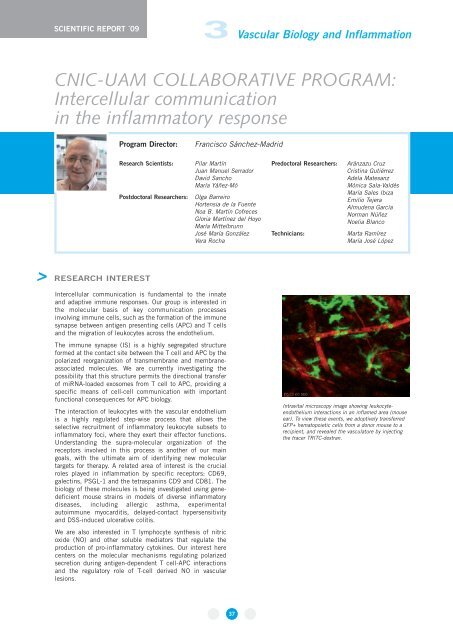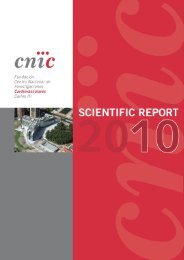Appendix - CNIC
Appendix - CNIC
Appendix - CNIC
You also want an ePaper? Increase the reach of your titles
YUMPU automatically turns print PDFs into web optimized ePapers that Google loves.
SCIENTIFIC REPORT ´09<br />
> RESEARCH INTEREST<br />
Intercellular communication is fundamental to the innate<br />
and adaptive immune responses. Our group is interested in<br />
the molecular basis of key communication processes<br />
involving immune cells, such as the formation of the immune<br />
synapse between antigen presenting cells (APC) and T cells<br />
and the migration of leukocytes across the endothelium.<br />
The immune synapse (IS) is a highly segregated structure<br />
formed at the contact site between the T cell and APC by the<br />
polarized reorganization of transmembrane and membraneassociated<br />
molecules. We are currently investigating the<br />
possibility that this structure permits the directional transfer<br />
of miRNA-loaded exosomes from T cell to APC, providing a<br />
specific means of cell-cell communication with important<br />
functional consequences for APC biology.<br />
The interaction of leukocytes with the vascular endothelium<br />
is a highly regulated step-wise process that allows the<br />
selective recruitment of inflammatory leukocyte subsets to<br />
inflammatory foci, where they exert their effector functions.<br />
Understanding the supra-molecular organization of the<br />
receptors involved in this process is another of our main<br />
goals, with the ultimate aim of identifying new molecular<br />
targets for therapy. A related area of interest is the crucial<br />
roles played in inflammation by specific receptors: CD69,<br />
galectins, PSGL-1 and the tetraspanins CD9 and CD81. The<br />
biology of these molecules is being investigated using genedeficient<br />
mouse strains in models of diverse inflammatory<br />
diseases, including allergic asthma, experimental<br />
autoimmune myocarditis, delayed-contact hypersensitivity<br />
and DSS-induced ulcerative colitis.<br />
We are also interested in T lymphocyte synthesis of nitric<br />
oxide (NO) and other soluble mediators that regulate the<br />
production of pro-inflammatory cytokines. Our interest here<br />
centers on the molecular mechanisms regulating polarized<br />
secretion during antigen-dependent T cell-APC interactions<br />
and the regulatory role of T-cell derived NO in vascular<br />
lesions.<br />
3 Vascular Biology and Inflammation<br />
<strong>CNIC</strong>-UAM COLLABORATIVE PROGRAM:<br />
Intercellular communication<br />
in the inflammatory response<br />
Program Director: Francisco Sánchez-Madrid<br />
Research Scientists: Pilar Martín<br />
Juan Manuel Serrador<br />
David Sancho<br />
María Yáñez-Mó<br />
Postdoctoral Researchers: Olga Barreiro<br />
Hortensia de la Fuente<br />
Noa B. Martín Cofreces<br />
Gloria Martínez del Hoyo<br />
María Mittelbrunn<br />
José María González<br />
Vera Rocha<br />
37<br />
Predoctoral Researchers: Aránzazu Cruz<br />
Cristina Gutiérrez<br />
Adela Matesanz<br />
Mónica Sala-Valdés<br />
María Sales Ibiza<br />
Emilio Tejera<br />
Almudena García<br />
Norman Núñez<br />
Noelia Blanco<br />
Technicians: Marta Ramírez<br />
María José López<br />
Intravital microscopy image showing leukocyteendothelium<br />
interactions in an inflamed area (mouse<br />
ear). To view these events, we adoptively transferred<br />
GFP+ hematopoietic cells from a donor mouse to a<br />
recipient, and revealed the vasculature by injecting<br />
the tracer TRITC-dextran.



